|
Echo Company 5th Battalion, 60th Infantry 3rd Brigade 9th Infantry Division VIETNAM, REPUBLIC OF Aug. 1969 to Aug. 1970 |
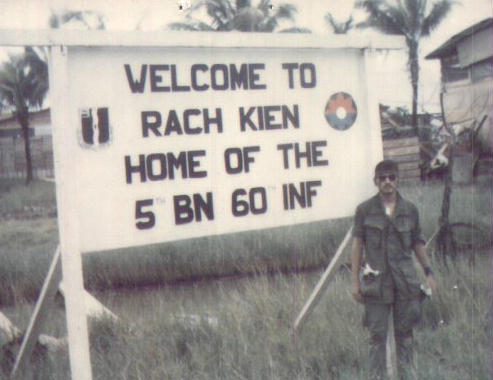 |
|
Echo Company 5th Battalion, 60th Infantry 3rd Brigade 9th Infantry Division VIETNAM, REPUBLIC OF Aug. 1969 to Aug. 1970 |
 |

 July 1969 |
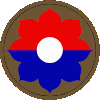 |
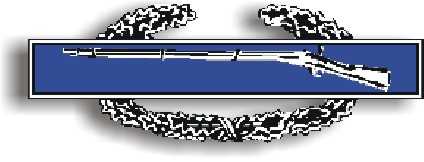
|
 |
 July 1970 |
 |
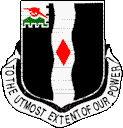 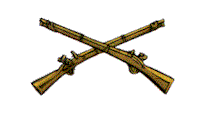 |
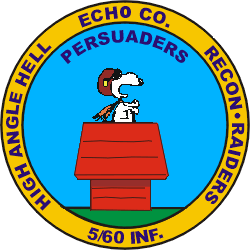 |
  |
 |
|
"Some
people
spend an entire lifetime wondering if they've made a difference in this
world.
Combat Veterans
don't have that problem."
|
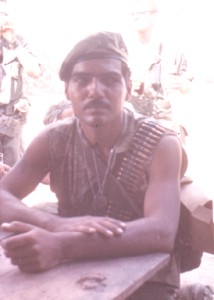
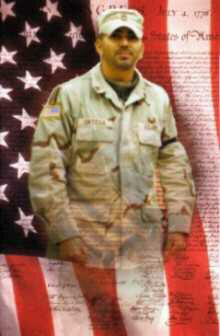
| When I left for Vietnam, my son Alex was 1 month old. He's a little older than that now. He's also a 20 year veteran currently stationed in Hawaii. Click on his picture to jump to his page or you can get there through the "Family" link on the Home Page. |
| I
was what others did not want to be . I went where others feared to go
and
did what others failed to do. I asked nothing for those who gave nothing, and reluctantly accepted the thought of eternal loneliness......should I fail. I have seen the stark face of terror; felt the stinging cold of fear; and enjoyed the sweet taste of a moments love. I have cried, pained and hoped.... But most of all I have lived times others would say were best forgotten. At least someday I will be able to say that I was proud of what I was........ a Soldier. |

![]()
 .. Familiar Colors In 1995, I worked as a Production Manager in a company in Carlsbad, CA. This company had it's own product line and it was marketed throughout the world. As a sales aid, the company built a "Demo Room" in which we could install, hook up and demonstrate the latest machinery to dealers and potential customers. To add to the international flavor of the rooms environment, we ordered a variety of international flags which would we would display all around the room. The set of flags included Viet Nam. The reaction of the Vietnamese employees was quite interesting when they saw the Communist flag unfurled. Some seemed offended that we would fly those colors and some just looked sad. Some insisted that we fly the more familiar colors. The decision not to display the flag at all seemed to pacify everyone.
|
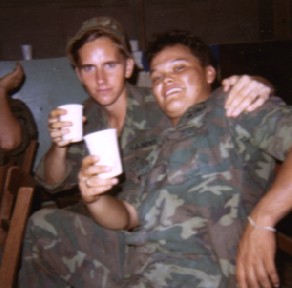
|
It was misreported then, and it is misremembered now. Rarely have so many people been so wrong about so much. Never have the consequences of their misunderstanding been so tragic." . No More Vietnams by Richard Nixon |
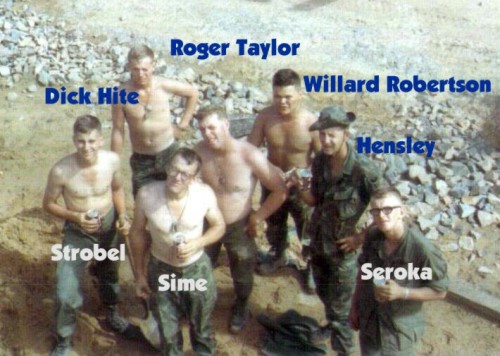
| Yes, there are 7 of them but they are not to be confused with "The Magnificent 7". Actually there were about 13 of us that arrived in country at the same time and these fine gentlemen are but a sample. Quite a few of us joined the Recon Platoon after arriving in Rach Kien. We were immediately placed according to the needs of the Army, which, at that particular point in time, was filling sand bags and putting them on the roof of a "Hooch". I don't think that we did a bad job either and I guess the knowledge that this was going to be our hooch helped motivate us to lay the bags thick. Anyone in the photo above that doesn't have a first name is a victim of memory fade which started 39 years ago. Someone please help me out....... By the way, it didn't bother anyone that I was documenting on celluloid for our posterity and that of our children's, this historic and monumental event instead of helping fill the sand bags. |
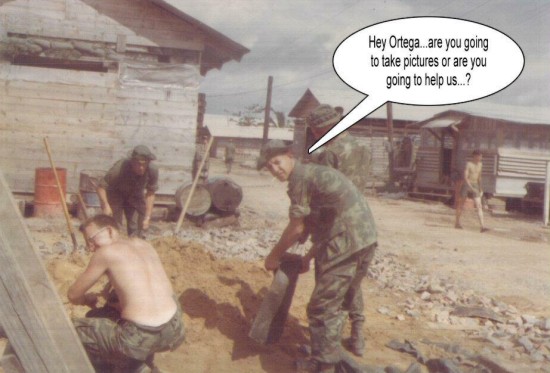

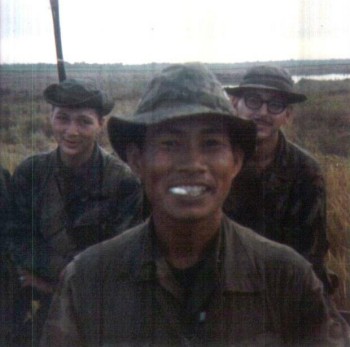
| Larry Baker was from Greenfield, Indiana. The ARVN was from..............I forget. I didn't know where Sgt Deane was from but in December of 1998, I made contact with him and learned that he is currently in Meriden, Conneticut. I've reformatted my hard drive since I made contact and lost the only e-mail I had from him so I'm drawing from my memory. I also made contact with Jim Wagner. I don't have a photo of Jim Wagner yet but I hope to have one soon. Jim was my replacement as point man for the Recon Platoon. He's near the Buffalo, NY area. I found both Jim and Clifford through the Roll Call page of Leon Baldwin's 9th Infantry Division Web Pages. |

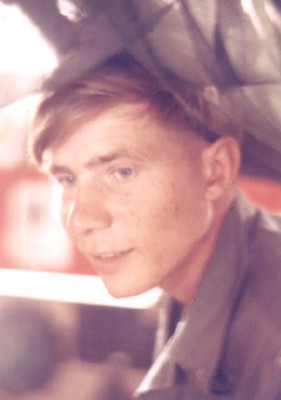
| What
can I say about good ‘ol Blunk? He was a real nice guy and I’ll
remember
him forever. He and I (along with a lot of others) were awarded an Army
Commendation with “V” Device for some overnight activity on the night
of
Dec. 23, 1969. However, I didn't have any clean uniforms for the
ceremont. But Blunk did. During the award ceremony, Blunk was standing
to my
right.
Blunk's name was announced and the General pinned his medal on him.
When
the General got to me he was a bit confused because the name that was
announced
was “David Ortega” but the name tag on my uniform said “Blunk”. The
General stated that it
might have been the wrong name but at least the uniform was clean.
Thanks again,
Blunk.
I guess I’ve always been a little impatient. One day when everyone lined up at the edge of a canal to board sampans to cross the canal, I thought I’d take a little short cut to an empty sampan. I ended up stuck belly button deep in the mud. This really concerned (scared) me because I was carrying the radio and it seemed that all of my struggling and extra weight was sinking me deeper and deeper. I had visions of choppers with hooks having to be called in to extract me from the mud. But who's that I see in the distance? Is it a bird? Is it a plane? It’s Blunk! Blunk went in after me by following my short trail in the mud. When he caught up with me, he helped me lift one leg and pushed me from behind forcing me to take a step toward the sampan. Once I took the step, I reached back and pulled him toward me again. We repeated this process until we reached the sampan and were both pulled out. Thanks again, Blunk! I wonder where you are now? |
 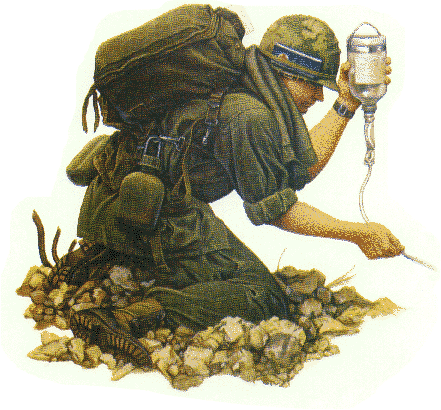 |
| A specialist in medicine, a combat medic never would wear his special markings to signify his medic status. The reason for this is that enemy guerrillas would always make a special effort to kill them. The army medics carried their numerous medical supplies in a heavy backpack. Carried in the band of the helmet was a special medical book, and around his neck was a towel, both of which were needed in emergencies. He is very susceptible to danger because he carried no weapons so that he could carry as many medical supplies as possible. The fact that they didn't carry and weapons shows how brave these soldiers are. As you can see from the photo above, our medic doesn't "own" a weapon....or pants for that matter! |

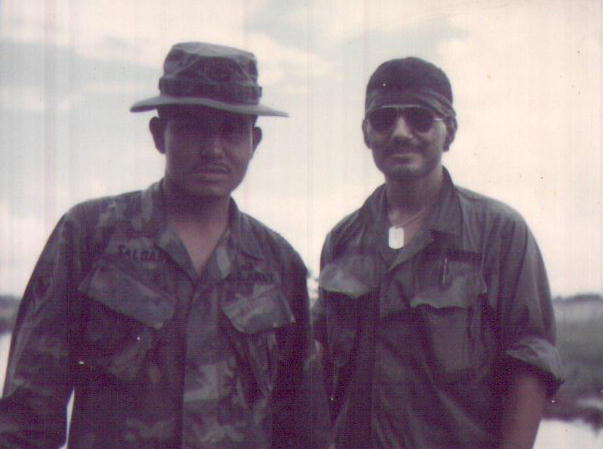
| David Saldaña was a short timer when I got to Rach Kien. As a matter of fact, I was his Assistant Machine Gunner the first time I went out to the field. The very first enemy death that I witnessed happened at the hands (or the M-60) of David. You know how it is when you're new in country, you find someone that you can put your trust in. Someone who will steer you clear of any stupid mistakes that you might make because you're scared or not paying attention. That person for me was SP4 David Saldaña from Eagle Pass, Texas. Right after this picture was taken, David turned to me, looked me in the eye and very gently said, "YOU KNOW, A FLARE WOULD DO A BETTER JOB OF GIVING AWAY OUR LOCATION TO THE ENEMY THAN THOSE DOG TAGS WOULD. BUT THEN AGAIN, WE COULD ALL SING SONGS AROUND A CAMPFIRE AND MAKE IT EVEN EASIER FOR THEM TO FIND US! I'M TOO SHORT FOR YOU FNG'S NOT TO BE PAYING ATTENTION!" He was my mentor, yes he was. |
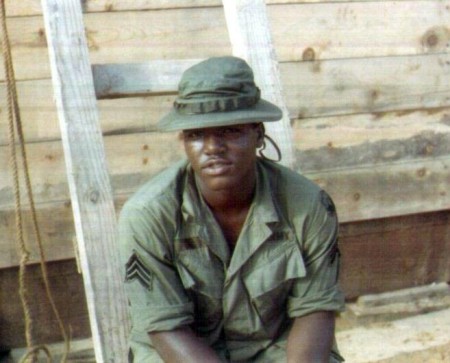
| I have no details on him. Another victim of memory fade. I think I was already in country when he arrived but I'n not sure. I'm not even sure if he was a grunt or not. I think I recall being in the field with him. Can anyone fill in the blanks? |
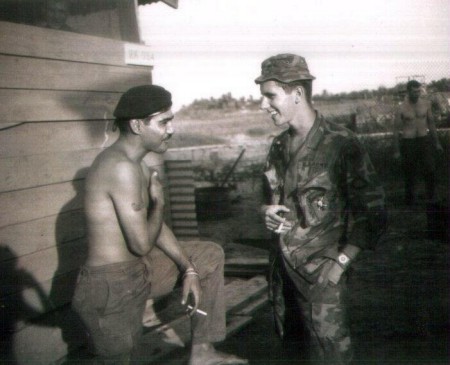
| Notice
that Strobel has the "Raiders" patch on his breast pocket. Echo Co. had
2 Recon type platoons. Recon and Raiders. I seem to remember some sense
of competition between the two units. Not everybody was into the "us -
them" thing. I think it might have been at a higher level that us
grunts.
I remember having gone out on patrol together with the Raiders.
By the way, in case you didn't know, a patrol is a detachment sent out from a larger unit to perform an assigned mission of reconnaissance or combat or a combination of both. The size of the patrol may vary according to the mission it is to perform. That description of a patrol is engraved in my memory and I can spit it out verbatim. As a prerequisite to Drill Sergeant School, I had to attend a 5 week Instructor Training Course at Fort Ord and patrolling was my main topic. Rather than admitting to having failed that course the first time around, I do confess that I did take it twice. |
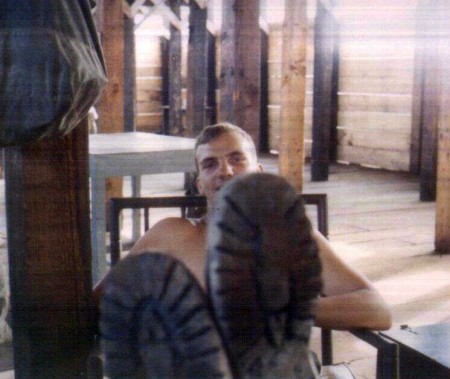
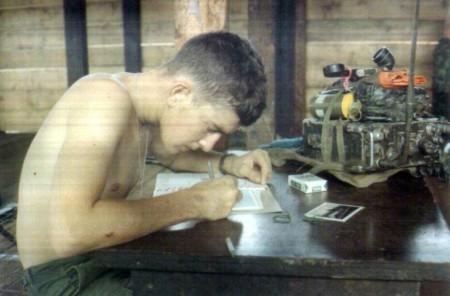
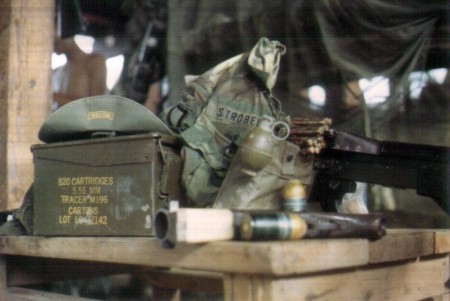
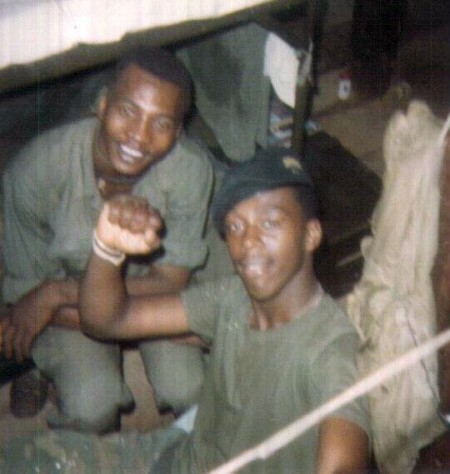
| This is the most outstanding incident about Toles that I remember. SSG Patterson came into the hooch with Top and began to ask Toles alot of question about drugs and the black market that was present in the village of Rach Kien. Toles said that he didn't know what they were talking about. They insisted that he go with them to the Orderly Room to see the CO. We were all kind of concerned about what was going on and I myself was surprised that Toles would have been doing or dealing any drugs. He was gone for about 30 minutes and when he came back to the hooch, he was a Buck Sgt! Pretty discrete, huh? |
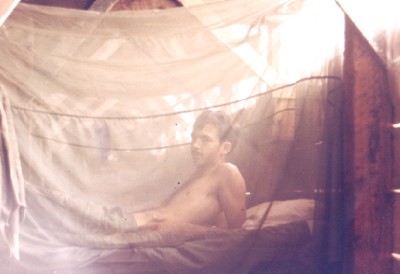
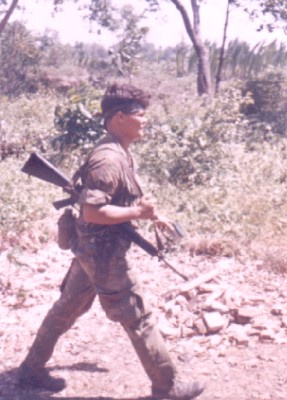
| I
met "Chief" upon arriving in country. We were always together in the
field
as well as during stand downs. I was closer to "Chief" than to anyone
else.
When we were about to DEROS, he decided to extend for an additional 6
months.
I chose to go home. I remember that we cried and hugged each other on
the
last day that I was at Binh Phouc. I gave him a ring that I wore on my
finger so that he would always remember me. I felt that we had a very
special
bond.
I received a letter from him after he left Viet Nam. He wrote that he had gotten a job as a Game Warden on his Reservation and was planning to get married. He lived in Okauchee, Wisconsin which I understand to be just East of Milwaukee along Interstate 94. He is a Chipewa Indian. |
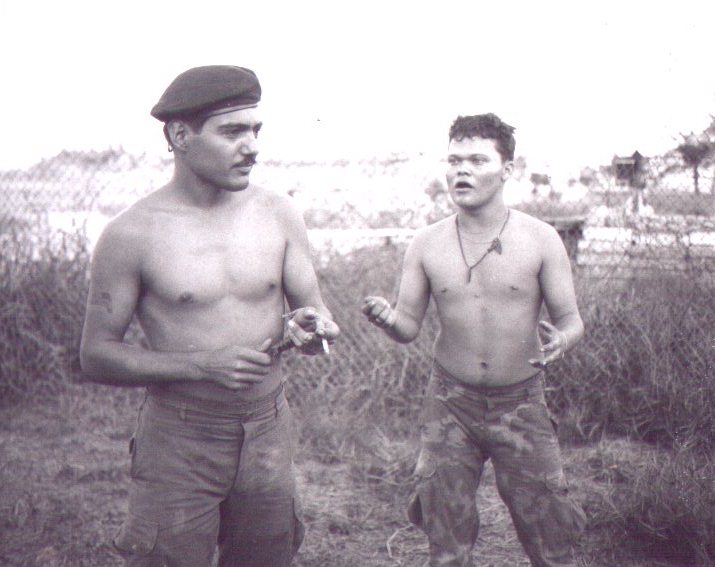
| Let
us understand: North Vietnam cannot defeat or humiliate the United
States.
Only Americans can do that. - Richard M. Nixon, 3 Nov. 1969 No
event in American history is more misunderstood than the Vietnam War.
It
was misreported then, and it is misremembered now. Richard M. Nixon, 28
Mar. 1985 Above
all, Vietnam was a war that asked everything of a few and nothing of
most
in America. Vietnam
presumably taught us that the United States could not serve as the
world’s
policeman; it should also have taught us the dangers of trying to be
the
world’s midwife to democracy when the birth is scheduled to take place
under conditions of guerrilla war. There
is the guilt all soldiers feel for having broken the taboo against
killing,
a guilt as old as war itself. Add to this the soldier’s sense of shame
for having fought
in actions that resulted, indirectly or directly, in the deaths of
civilians.
Then pile on top of that an attitude of social opprobrium, an attitude
that made the fighting
man feel personally morally responsible for the war, and you get your
proverbial
walking time bomb. |
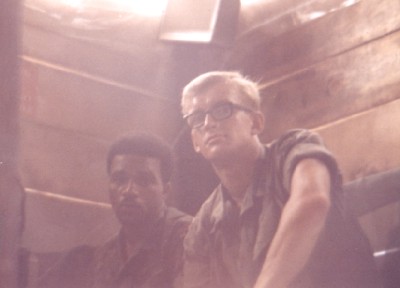
| I had set a 1 lb. charge of C-4
to destroy an enemy bunker. We were not being
pursued or in pursuit so I left plenty of "det" cord (about 1 min) so
that
I could gingerly "walk" to safety. Somehow, she didn't blow. There was
a Major with us that sent me back to reset the charge. I was a little
reluctant
because maybe it would blow just as I approached the bunker. Sgt.
Andrew
Jackson sensed my hesitation.
He went with me. While I was re-setting the charge Sgt. Jackson provided me with security. I was using his bayonet to cut the fuse cord. In the process, I stabbed myself in the leg (accidentally) and Sgt. Jackson did an impressive, "by the reg" First Aid number on me until Doc Sanders could practice his trade on me.. I got to stay in the rear for a couple of days due to the puncture. SP4
Seroka was one of my friends from day one. We arrived in country at the
same time. The thing that I remember most about him was that he was
"The
King of the Polish Joke". He (being Polish) had a good one for just
about
any situation, occasion or circumstance that you could think of. |
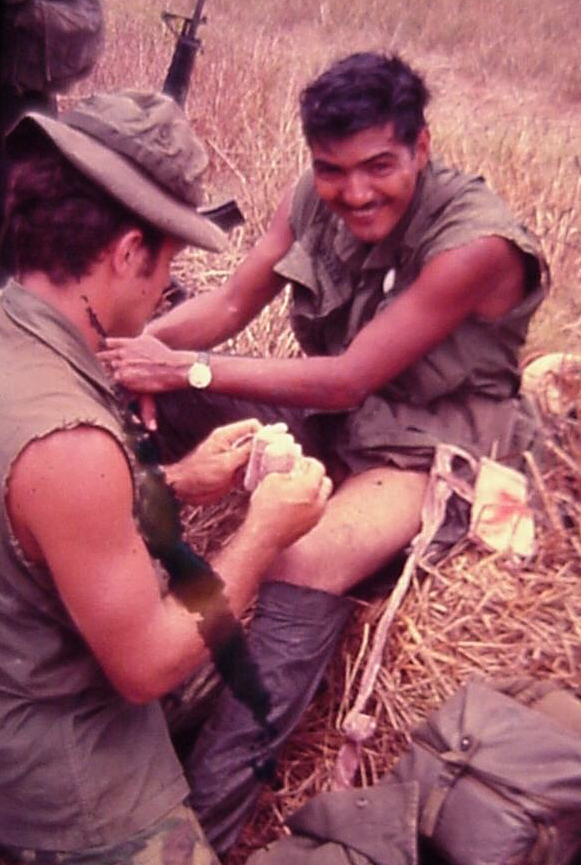 |
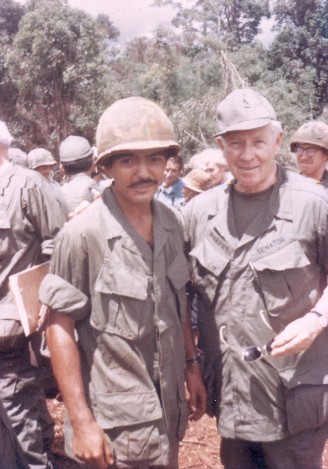
| I
had to go all the way to Cambodia to get an audience with my State
Senator.
Actually, the Senator traveled around the world to see me as part of
President
Nixon's Fact Finding Tour. Senator John Tower of Texas was also there.
We were in the Parrot's Beak Area of Cambodia on Shakey's Hill. We were
there for about 30 days or so.
I remember all of the preparations that were conducted prior to the arrival of the Senators. Barbers were flown in on choppers to give us hair cuts, new uniforms were issued and the area was cleaned up. Our latrine used to be a 2 X 12 with a hole cut out and laid across a cut off 55 gal. drum. However, carpenter's were flown in prior to the Senators arriving and converted them into decent plywood paneled latrines with doors and toilet paper holders. When everyone left the hill, they took the latrines with them. While the Fact Finding Tour was arriving on
the hill, I was
put on a detail of wiping mud off of some K54 holsters that were found
in one of the cache
sites and handing them out to whoever went past me. I suppose that that
was to make up for the fact that we ran out of "Shaky's Hill" souvenier
tee shirts! |
![]()
[Back
to
Top] [Back
to Home Page]
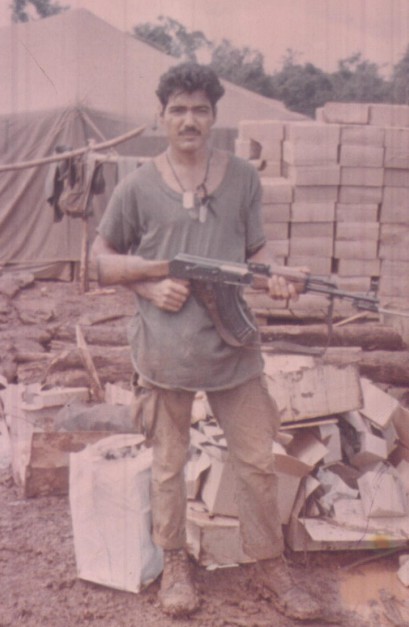
[Back
to
Top] [Back to Home Page]
|
|
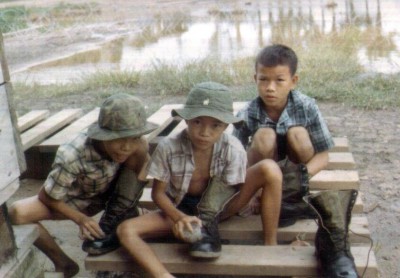
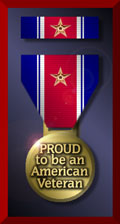
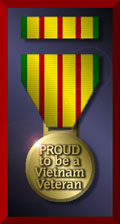
|
After peaking in 1980 at nearly 29 million, the nation's population of US military veterans has been declining for 15 years, reaching about 26 million in 1994. Of the total, 13.5 million were Army veterans, 6.1 million from the Navy, 4 million from the Air Force, 2.1 million from the Marine Corps, and 366,772 from the Coast Guard. During the first 216 years of our nation, nearly 40 million Americans have worn the nation's uniform during war, with most serving during four wars in the 20th century - the two World Wars, Korea and Vietnam. More than a million in service did not survive to become veterans. Of the total who died in service, 650,563 were killed in battle and 486,329 died otherwise while 1.4 million received wounds that were not fatal, bringing the casualty total to 2.6 million. The Persian Gulf War accounted for the fewest battle deaths (148) while World War II accounted for the most (292,131) The Civil War was only slightly behind in battle deaths with 214,938. Of the 26 million veterans in 1994, 2.3 million were receiving compensation for service-related disabilities; 704,785 from the Vietnam War, 691,942 from WWII, 190,531 from the Korean War, and 602 from WWI. One million veterans were patients in hospitals in 1995. In 1976 the number of female veterans passed the one million mark and by 1995 was 1.2 million, while male veterans totaled 25 million. |